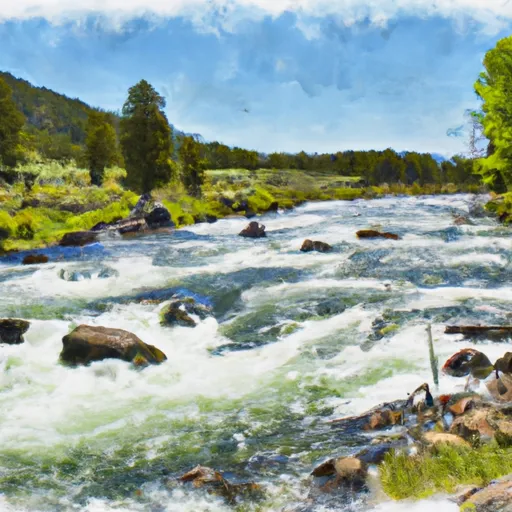2026-03-05T18:00:00-07:00
The National Weather Service in Denver has issued a Fire Weather Watch for wind and low relative humidity, which is in effect Thursday afternoon. * AFFECTED AREA...Fire Weather Zones 241, 245, 246 and 247. * TIMING...Thursday afternoon. * WINDS...South 15 to 25 mph with gusts up to 35 mph. * RELATIVE HUMIDITY...As low as 10 percent. * IMPACTS...Conditions will be favorable for rapid fire spread. Avoid outdoor burning and any activity that may produce a spark and start a wildfire.
Summary
Total streamflow across the
Madison River
was last observed at
3,895
cfs, and is expected to yield approximately
7,726
acre-ft of water today; about 80%
of normal.
Average streamflow for this time of year is
4,846 cfs,
with recent peaks last observed
on
2011-06-25 when daily discharge volume was observed at
26,220 cfs.
Maximum discharge along the river is currently at the
Madison River Bl Ennis Lake Nr Mcallister Mt
reporting a streamflow rate of 1,170 cfs.
This is also the highest stage along the Madison River, with a gauge stage of
3.62 ft at this location.
This river is monitored from 6 different streamgauging stations along the Madison River, the highest being situated at an altitude of 6,634 ft, the
Madison River Near West Yellowstone Mt.
15-Day Weather Outlook
River Details
| Last Updated | 2026-03-03 |
| Discharge Volume | 7,726 ACRE-FT |
| Streamflow |
3,895.0 cfs
-26.0 cfs (-0.66%) |
| Percent of Normal | 80.37% |
| Maximum |
26,220.0 cfs
2011-06-25 |
| Seasonal Avg | 4,846 cfs |
River Streamflow Levels
| Streamgauge | Streamflow | Gauge Stage | 24hr Change (%) | % Normal | Minimum (cfs) | Maximum (cfs) | Air Temp | Elevation |
|---|---|---|---|---|---|---|---|---|
|
Madison River Near West Yellowstone Mt
USGS 06037500 |
349 cfs | 1.71 ft | 4.18 | |||||
|
Madison River Bl Hebgen Lake Nr Grayling Mt
USGS 06038500 |
699 cfs | 1.54 ft | 0 | |||||
|
Madison River At Kirby Ranch Nr Cameron Mt
USGS 06038800 |
762 cfs | 1.65 ft | 0 | |||||
|
Madison River Near Cameron Mt
USGS 06040000 |
915 cfs | 2.12 ft | 0 | |||||
|
Madison River Ab Powerplant Nr Mcallister Mt
USGS 06040800 |
109 cfs | 3.15 ft | 0 | |||||
|
Madison River Bl Ennis Lake Nr Mcallister Mt
USGS 06041000 |
1170 cfs | 3.62 ft | -3.31 |
Seasonal Discharge Comparison
Maximum Streamflow Discharge
Streamflow Elevation Profile
The Madison River is a headwater tributary of the Missouri River, approximately 183 miles (295 km) long, in Wyoming and Montana. Its confluence with the Jefferson and Gallatin rivers near Three Forks, Montana forms the Missouri River.
The Madison rises in Teton County in northwestern Wyoming at the confluence of the Firehole and Gibbon rivers, a location known as Madison Junction in Yellowstone National Park. It flows west then north through the mountains of southwestern Montana to join the Jefferson and Gallatin rivers at Three Forks. The Missouri River Headwaters State Park is located on the Madison at Three Forks. In its upper reaches in Gallatin County, Montana, the Hebgen Dam forms Hebgen Lake. In its middle reaches in Madison County, Montana, the Madison Dam forms Ennis Lake and provides hydroelectric power. In 1959, the 1959 Hebgen Lake earthquake formed Quake Lake just downstream from Hebgen Dam. Downstream from Ennis, the Madison flows through Bear Trap Canyon, known for its class IV-V whitewater. The Bear Trap Canyon section is part of the Lee Metcalf Wilderness area.
The river was named in July 1805 by Meriwether Lewis at Three Forks. The central fork of the three, it was named for U.S. Secretary of State James Madison, who would succeed Thomas Jefferson as President in 1809. The western fork, the largest, was named for President Jefferson and the east fork for Treasury Secretary Albert Gallatin.
The Madison is a Class I river in Montana for the purposes of access for recreational use.

 Beartrap Canyon - Madison Dam to Route 84
Beartrap Canyon - Madison Dam to Route 84
 Madison River
Madison River